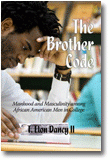
The Brother Code
Manhood and Masculinity among African American Men in College
By:
T. Elon Dancy II, University of Oklahoma
A volume in the series: Contemporary Perspectives in Race and Ethnic Relations. Editor(s): M. Christopher Brown, Thurgood Marshall College Fund. T. Elon Dancy, The University of Pittsburgh.
Published 2012
The Brother Code: What is the role of manhood and masculinity in the lives of African American males in college? How do manhood norms influence decisions within and beyond college? How might mothers and fathers differentially affect manhood and masculinity in their sons? What are African American’s men unique ways of knowing themselves and their surroundings? The Brother Code: Manhood and Masculinity among African American Men in College situates itself at the intersection of higher education and cultural studies to address these questions and more. Primarily, this book offers colleges and universities a penetrative gaze into a complex web of identities—the manhood of African American males in college. Yet the book also seizes a rare opportunity in higher education research to review six historical eras of African American manhood as well as the troublesome relationship between African American males and education in general.
This knowledge is important for understanding all aspects of African American male participation in college, including enrollment, retention, curricular, and co-curricular involvement. Based on an empirical study, the data in this book emerged from one-on-one interviews in which 24 African American males enrolled in 12 colleges discussed how manhood matters in their social and college lives. The aim is to help unearth the marginalized topics of manhood, gender, and masculinity in males generally but, more specifically among African American males, a marginalized student group in education. Using an interdisciplinary approach, the book draws upon literature in history, African American studies, gender studies, sociology, cultural studies, psychology, and anthropology.
CONTENTS
Foreword.
Dedication.
Acknowledgments.
1: The Brother Code: Canons, Confessions and Colleges, An Introduction.
PART I. EXPLORING CONTEXTS.
2: African American Males and Education: Mining the Collegiate Context.
3: Historical Perspectives on African American Manhood: Six Eras of Revolutionary Change.
4: Manhood Rules, Education Rules: Issues of Convergence and Departure.
PART II. EXAMINING VOICES.
5: Defining Manhood: Constructions, Communities, and Cognitive Dissonance.
6: Through the (Manhood) Looking Glass: (Re)Envisioning the College Experience.
7: Black Men’s Ways of Knowing: A Taxonomy of Manhood or Stereotypes?
8: Centering African American Men in College: New Horizons for Theory, Research, and Practice.
Afterword.
Appendix A: Methodological Scheme and Praxis.
Appendix B: Institutional Matrix.
Appendix C: Sample Interview Protocol.
REVIEWS
"This book starts a conversation that is much needed. Educators and all those who care about the success of African American men should Dancy's work to be most insightful." Eric M. Mridges in PsycCRITIQUES
-
Paperback978-1-61735-760-2
Web price: $45.04 (Reg. 52.99)
-
Hardcover978-1-61735-761-9
Web price: $80.74 (Reg. 94.99)
- eBook978-1-61735-762-6

- EDU037000 - EDUCATION: Research
- EDU020000 - EDUCATION: Multicultural Education
- EDU015000 - EDUCATION: Higher
-
 A Trace for the Next Generation
Young Black Theorists Confronting Transnational Racism
A Trace for the Next Generation
Young Black Theorists Confronting Transnational Racism
-
 African American Males and Education
Researching the Convergence of Race and Identity
African American Males and Education
Researching the Convergence of Race and Identity
-
 Filling in The Blanks
Standardized Testing and the Black-White Achievement Gap
Filling in The Blanks
Standardized Testing and the Black-White Achievement Gap
-
 Is That Your Mom?
Voices of Cross Racially Raised Adults of The African Diaspora
Is That Your Mom?
Voices of Cross Racially Raised Adults of The African Diaspora
-
 Models of Success
How Historically Black Colleges and Universities Survive the Economic Recession
Models of Success
How Historically Black Colleges and Universities Survive the Economic Recession
-
 STEM Models of Success
Programs, Policies, and Practices in the Community College
STEM Models of Success
Programs, Policies, and Practices in the Community College
-
 The Pursuit of Excellence
Kentucky State University, 1886-2020
The Pursuit of Excellence
Kentucky State University, 1886-2020

